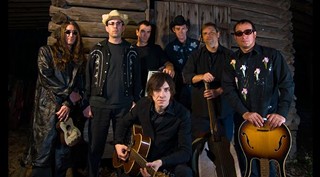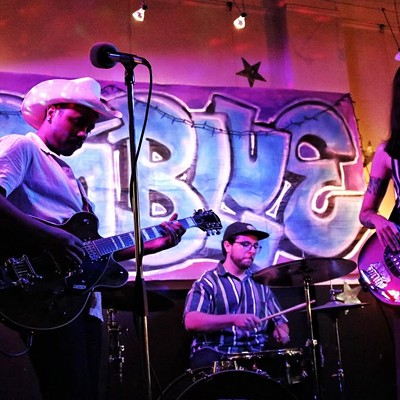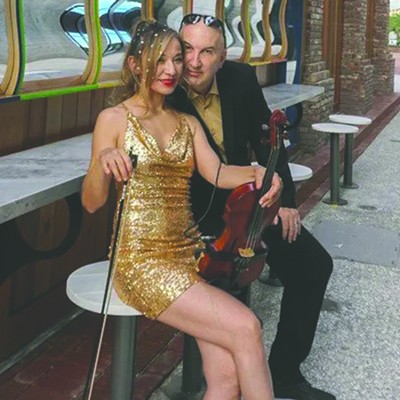Seven guys, seven instruments. Separate lives. Families. Jobs and careers. Other bands.
Flying as ever in the face of logic, the Savannah band Superhorse has assembled once more to blast the Jinx with sharp and sinewy rock ‘n' roll. The show is Saturday, Jan. 5, with California's Whiskey Pills Fiasco.
The song title that best describes the Superhorse manifesto, says drummer Jim Reed, is "Still is Still Moving to Me," from Willie Nelson's seminal 1993 album Across the Borderline (check it out; you'll be glad you did). The phrase "still is still moving" sounds just about right to these guys.
"The fact that we're still around, and we still can get together from time to time and write songs and play shows is some sort of bizarre rock ‘n' roll triumph," Reed laughs.
The thing is, Superhorse came alive in 1994, a different age entirely in the historical annals of Savannah music. An offshoot of the richly bizarre GAM, Superhorse was - and is - more pure rock ‘n' roll than its parent outfit.
Superhorse spent a good part of 1990s riding hard on top of the scene.
The Jan. 4 show will be their first since February, 2011. ("But we played the Jason Statts benefit last April," Reed points out. "If it wasn't for that, it would be two years. We would all do anything for Jason Statts. If somebody said ‘You can help Jason Statts out by playing every Friday night somewhere,' we probably would.")
The same seven players still make up the ‘Horse. There's vocalist Keith Kozel, drummer Reed, bassist Gene Lyons, keyboard player Jason Anderson guitarists Kevin Rose, Sebastian Edwards and Bob Holman.
It's not lethargy or laissez-faire that keeps them from constant horsing around. It's that pesky thing called real life.
"We frick and frack as well as the best of ‘em," says Reed. "We're all extremely different people. We talk about it like this: Rather than being a typical band, Superhorse is more of a fraternal organization that happens to play music."
The band, which is hemming and hawing its way to finishing its third album in 18 years, retains a strong fan base in town. "Sometimes when we play a show," Reed explains, "people will hear a song and go ‘Oh wow, you guys have a new song!' when, in reality, it's a song we wrote six years ago but we'd only played it in public once.
"Sometimes they're new, legitimately, but other times it's a song that we wrote, we rehearsed the hell out of, we played it once three years ago. And then the next time we got together to play a show, somebody in the band didn't want to play it, or forgot how it went."
The seven-headed monster is in rehearsal for this show. However, Reed says, "They can be very intense rehearsals. And they can be very emotional rehearsals.
"So usually by the time the show comes around, we've sort of had our recommended yearly allowance of each other's company. I mean that in totality as group, because we all love each other, we're friends and all that stuff, but it's a pressure cooker to get ready for these shows.
"So after we play the show, it's like we all just retreat to our neutral corners, and it takes a while before we can consider the notion of getting together and doing that again."
Bluegrass Boxcars
Randy Wood Guitars welcomes The Boxcars back Jan. 4. This is now one of the premiere bluegrass bands in the county, winner of the 2012 Instrumental Group of the Year Award from the International Bluegrass Music Association.
The band's Adam Steffey took the prize for Mandolin Player of the Year (he'd won it six times previously).
The other awe-inspiring frontman in the Boxcars is multi-instrumentalist Ron Stewart, who spent six years as fiddler for JD Crowe & the New South. Stewart also played banjo (and fiddle) in the Dan Tyminski Band, an off-shoot of Alison Krauss & Union Station (Steffey was that group's mandolinist).
The other Boxcars are fiddler and banjo player John R. Bowman (stints with Union Station, Doyle Lawson & Quicksilver, the New South and the Isaacs), guitarist Keith Garrett (co-founder of Blue Moon Rising) and standup bassist Harold Nixon (a dozen years in the New South).
"On a scale of one to 10," Steffey told me in 2011, if you put five in the middle as traditional, kind of straight-up bluegrass, and 10 as progressive, we're probably about a five and a half to a six.
"Of course, we're not wearing the matching cowboy hats and ties and all that, or the Porter Wagoner outfits, but the stuff we play is certainly more towards the traditional as far as the arrangements go. We try to do a lot of original things, and we're real lucky that Keith and Ron both are great songwriters. That's something that you have to have."



























